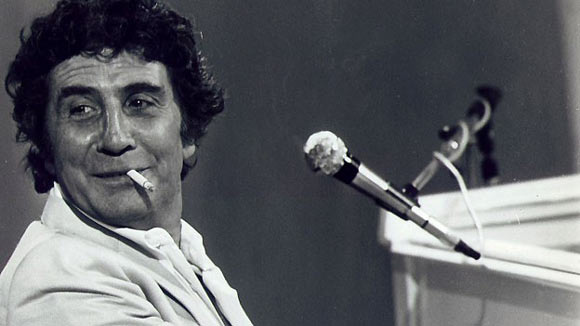
Gilbert Bécaud was born in Toulon, France on October 24, 1927 as François Gilbert Léopold Silly. His father abandoned the family when Gilbert was very young, but his stepfather Louis Bécaud raised him and his siblings Odette and Jean. His mother Madame Silly, a musician herself, supported Gilbert’s passion for music and he learned the piano at an early age and joined the Nice conservatory at the age of 9. He continued his studies there till 1942 when his family had to leave their hometown Toulon due to World War II. In 1943 he joined the French Resistance with his Brother Jean during the war. After the war was over his family settled in Paris. Soon, the 20 year old Gilbert was hired in Parisian cabarets and local bars as a pianist. In 1948, he met the songwriter Maurice Vidalin who inspired him to write his own compositions which gave his career a new direction. He then started writing songs for the Parisian singer Marie Bizet. She introduced him to the songwriter Pierre Delanoë, and Bécaud, Vidalin and Delanoë became a successful songwriting trio with countless hits in the 1940’s and 1950’s. He married Monique Nicholas in 1952.
Bécaud met Édith Piaf, a very famous French singer, during an international tour with her husband Jacque Pills. She encouraged him to start his singing career in 1953 with the songs “Les croix” and “Mes mains”. The multitalented Bécaud started his acting career in 1956 with Marcel Carné’s film “Le Pays d’où je viens”, for which he also wrote the soundtrack. His singing career in the meanwhile rose to new heights and by 1960’s he was a renowned star in the international music scene. He was admired in 1960 by French critics with the prestigious Grand Prix du Risqué for his singing and songwriting. A year after he managed to sing the most successful song of his career, “Et maintenant”, with its English version “What now my love” becoming a huge international hit as well.
Many famous singers including Elvis Presley and Frank Sinatra covered his songs successfully giving the songwriter a credibility that lasted well beyond his living days. In 1976 he married Kitty St John. The next year he recorded “L’indifférence” with his friend and fellow songwriter Maurice Vidalin, which earned him the prestigious “Oscar de la meilleure chanson originale”. Later in 1980 his huge contribution to the French music world was accredited by the SACEM (the French association of Songwriters and Composers), and he earned one of their prestigious gold medals. He then celebrated the success of his musical “Madame Roza” which debuted in the United States.
The death of his mother and close friend Yves Montand deeply grieved Bécaud and he retreated from the music scene, even indicating an early retirement to his faithful followers. To their relief he resumed his career in 1991 and carried on till 2001 with many successful tours his last being in Fribourg, Switzerland.
After a long battle with cancer, Bécaud passed away on December 18, 2002. His son Gaya published his last album with selected songs, focusing more on the topics of God and Death to respect his deceased father. His successful career spanning over four decades gained him a huge following worldwide and his charisma and legendary energy attracted all generations alike. Gilbert Bécaud indeed left a huge mark in the French music history as a brilliant singer and songwriter.